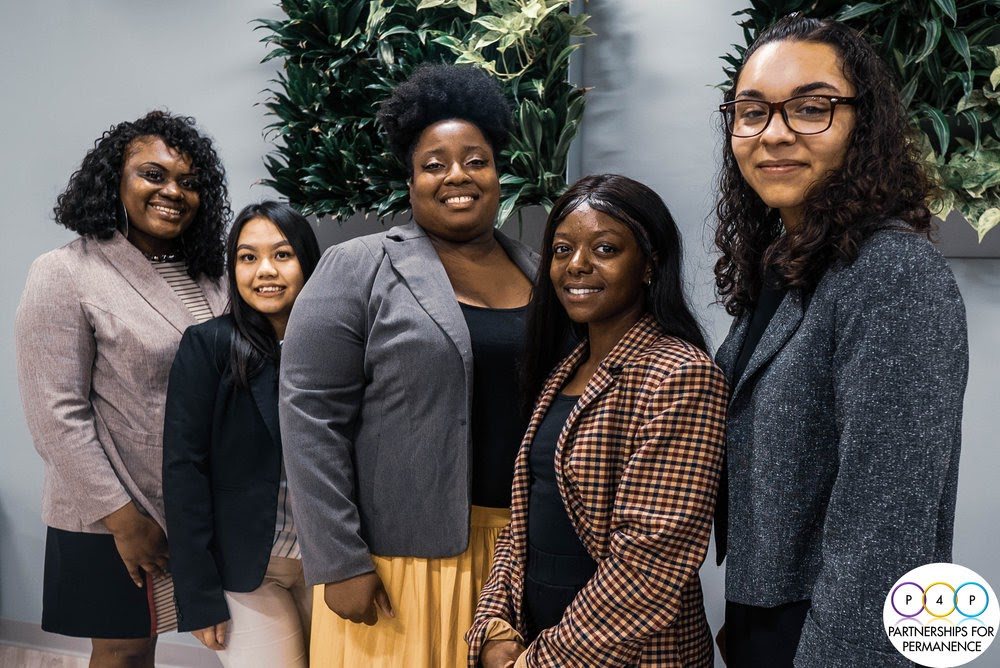Partnerships for Permanence

Lola Adebara, the founder and CEO of Partnerships for Permanence, was tired of seeing young people used as a token to elevate other people’s agendas. She wanted to bring together young people, especially those with experience in the foster care and adoption system, to work to change the systems they were part of. “We needed to increase the number of young leaders doing similar work,” said Lola. “They’re brought in to share their stories on foster care and adoption, which is great, but that’s often where their input stops.” The mission of Partnerships for Permanence is to develop those young people as experts so they can help lead the systems change.
“Fiscal sponsorship has provided us with the structure, system and the plan to do this work. You can have the passion for the work, but you need to have a system to sustain it.”
Lola Adebara, Founder and CEO, Partnerships for Permanence
Lola herself has served as a guardian ad litem for several years. She also has over a decade of experience in the youth development field, including as a family and children’s worker specializing in youth aging out of care and as an advocate working for legislative and policy reforms. Through these experiences, she witnessed how our foster care system was failing the young people it sought to support. “As a professional, I saw so many young people transition into adulthood with very few adult partners,” said Lola. “After you age out of the system, you’re on your own unless you’ve formed your own family.” Her goal in starting Partnerships for Permanence was to shift the approach from using the stories of these youth as a tool to putting those young people at the decision-making table to help transform youth foster care. She also wanted to build in a system of support for young people aging out of the foster care system so they would feel supported in their next steps.
Using Fiscal Sponsorship to Grow Capacity to Grow Impact
As the Partnerships for Permanence network grew, Lola started applying for grants to support the work and to compensate the youth who were involved. However, she needed a 501(c)(3) fiscal host to be eligible for funding. That’s when she turned to Propel Nonprofits (MAP for Nonprofits at the time) to explore fiscal sponsorship. “Just the application process was really good for us because it gave us a chance to step back and think about what our goals were, what our strategy was, and how we needed to increase our capacity to grow our impact,” Lola remembered.
Lola and others she was working with also attended Propel Nonprofits’ trainings on finances, received accounting assistance, and used other resources, like legal referrals. “Not only were we in good hands, but it was beneficial to our growth,” Lola said. “Being in the fiscal sponsorship program allowed us to grow our muscle of working on a very low budget, of not giving up, of handling rejection. I’m proud of how much we were able to accomplish with the resources we had.” She has seen the young people give back to the organization with their talents, time, and resources. That in turn has attracted other supporters.
New Program Develops Leaders to Change the System
All of Lola and her team’s hard work are leading to some meaningful outcomes. Last year the organization launched its 6-week leadership and mentorship program to give young people skills on advocacy, exploring career options, and building leadership skills. After graduating from the program, they are matched with an adult professional in a field of interest for them to help them navigate through their leadership journey. “It’s been dynamic, but it’s also required a lot of structure, planning, and partnerships,” said Lola. “My life growing up was very similar to a lot of these young people. For me, giving them support is motivation to keep going.”

This past year, Partnerships for Permanence applied for and received its own 501(c)(3) status, with assistance from Propel staff to prep financial documents and reporting forms for the application and to transition out of fiscal sponsorship. “It was great to see their commitment to setting us up for success,” Lola noted. As Partnerships for Permanence has “flown the fiscal sponsorship nest,” Lola is glad this is the approach the organization used to get started. “Fiscal sponsorship has provided us with the structure, system and the plan to do this work. You can have the passion for the work, but you need to have a system to sustain it.”
Partnerships for Permanence is redirecting its resources, providing expert training, and supporting its young leaders learn how to cope with change during these unprecedented times. If you’re interested in donating to help it continue to partner with young people and inspire change within systems of care, please visit Partnerships for Permanence’s website at: https://www.partnershipsforpermanence.org/donate.
Photos provided by Partnerships for Permanence
